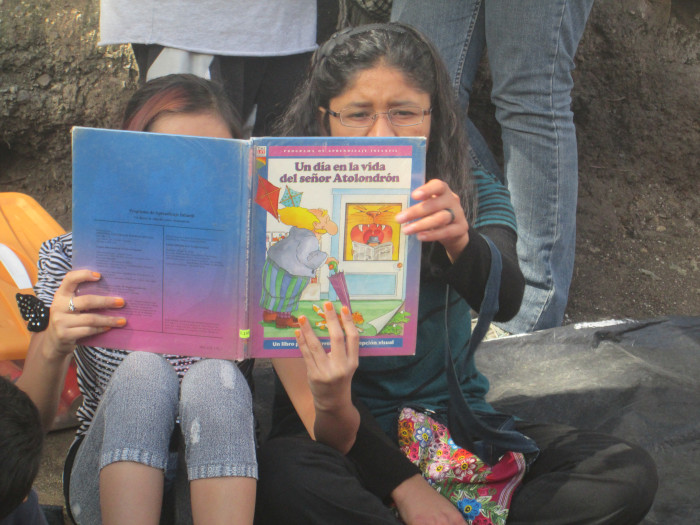Reading Club – A Meaningful Experience

ATD Fourth World Guatemala’s reading club, aims to implement new strategies and techniques to inspire a love of reading among the most vulnerable children of Lomas de Santa Faz, a neighborhood in Guatemala City.
By ATD Fourth World Guatemala
Why a reading club?
We had been carrying out a book lending program in the neighborhood of Lomas de Santa Faz for several years. While visiting the families, we noticed that many of the children were eager to have a different type of experience with books and this inspired the reading club.
We began this great adventure in 2018 with a group of just seven boys and girls. As time went on, we started inviting others, prioritizing the children from the most disadvantaged backgrounds. Currently, 40 boys and girls aged 7 to 15 attend the reading club, all eager to discover their passion for reading.
We first met the García family in 2019. Because of her work commitments, Doña Carla, a single mother, has no choice but to leave her three children alone at home. While she has full trust in them and does everything in her power to support and care for them, the family’s circumstances are difficult.
The pandemic in 2020 posed serious challenges for everyone. For the families of Lomas de Santa Faz, these challenges resulted in suffering and despair, particularly on an economic and educational level.
The pandemic led to schools closing and governments promoting remote learning through online platforms. When Guatemala adopted this approach, various issues arose. Some families did not have the internet at home or cell phones. Consequently, many had to rely on workbooks, which was not a favorable method of learning for these children.
Antony
At that point, the reading club had to adopt new strategies and techniques to help children to discover their love of reading, like those in the García family. Antony, 6 years old and the youngest of the children, started school that year. He did as well as he could in the 1st grade, but the real challenge came the following year when he entered the 2nd grade unable to read and recognizing only a few letters of the alphabet. Because of his difficulties, Antony was shy and uncomfortable around the other students, and the school put a lot of pressure on him to learn.
We set out to support Antony emotionally on this journey. When we invited Antony to the reading club, we wanted to make sure that it was a meaningful and motivating experience for him, so we adapted some stories into pictograms. Antony rarely missed reading club meetings. Over time, practicing silent reading and reading aloud helped Antony to develop a bond with books.
For Antony, the reading club became more than a space for learning, it was somewhere he could also develop his own sense of freedom, security and self-confidence. The other children learned to respect and appreciate Antony’s pace of learning. Even with the few letters of the alphabet he recognized, Antony was always part of the group reading, and always followed the same books as the others.
“I want to start…”
One day, Antony surprised us by saying, “I want to start the group reading. I practiced on the first page of the book, and I can read it. Please, I want to start the reading. I promise to do it in a veeeeery loud voice.”
Although it was a page with only a few words, the important thing was that Antony had finally found his moment. This surprise brought joy to the entire group, and the children applauded and congratulated him when they heard him read.
Antony is a reminder that we all have our own pace and our own way of learning. He reminds us that teaching should be tailored to a child’s developmental stage and not forced.

